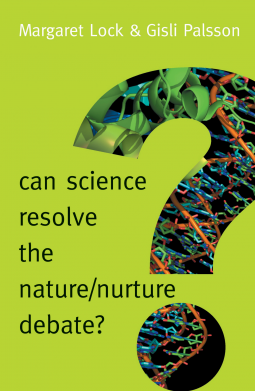
Can Science Resolve the Nature / Nurture Debate?
by Margaret Lock and Gisli Palsson
This title was previously available on NetGalley and is now archived.
Buy on Amazon
Buy on Bookshop.org
Buy on Waterstones
*This page contains affiliate links, so we may earn a small commission when you make a purchase through links on our site at no additional cost to you.
Send NetGalley books directly to your Kindle or Kindle app
1
To read on a Kindle or Kindle app, please add kindle@netgalley.com as an approved email address to receive files in your Amazon account. Click here for step-by-step instructions.
2
Also find your Kindle email address within your Amazon account, and enter it here.
Pub Date 27 Jun 2016 | Archive Date 10 Oct 2016
Description
Following centuries of debate about "nature and nurture" the discovery of DNA established the idea that nature (genes) determines who we are, relegating nurture (environment) to icing on the cake.
Since the 1950s, the new science of epigenetics has demonstrated how cellular environments and certain experiences and behaviors influence gene expression at the molecular level, with significant implications for health and wellbeing. To the amazement of scientists, mapping the human genome indirectly supported these insights. Anthropologists Margaret Lock and Gisli Palsson outline vituperative arguments from Classical times about the relationship between nature and nurture, furthered today by epigenetic findings and the demonstration of a "reactive genome." The nature/nurture debate, they show, can never be put to rest, because these concepts are in constant flux in response to the new insights science continually offers.
Margaret Lock is Marjorie Bronfman Professor Emerita in Social Studies of Medicine at McGill University
Gisli Palsson is Professor of Anthropology at the University of Iceland
UK Pub Date: 27/6/2016
UK Price: £9.99
Since the 1950s, the new science of epigenetics has demonstrated how cellular environments and certain experiences and behaviors influence gene expression at the molecular level, with significant implications for health and wellbeing. To the amazement of scientists, mapping the human genome indirectly supported these insights. Anthropologists Margaret Lock and Gisli Palsson outline vituperative arguments from Classical times about the relationship between nature and nurture, furthered today by epigenetic findings and the demonstration of a "reactive genome." The nature/nurture debate, they show, can never be put to rest, because these concepts are in constant flux in response to the new insights science continually offers.
Margaret Lock is Marjorie Bronfman Professor Emerita in Social Studies of Medicine at McGill University
Gisli Palsson is Professor of Anthropology at the University of Iceland
UK Pub Date: 27/6/2016
UK Price: £9.99
Advance Praise
We know that nature and nurture are entwined, but we often overlook the fact that neither science nor the humanities alone can resolve the nature-nurture debate. This accessible and clever book introduces the reader to recent discoveries in epigenetics and shows how the new horizons and hopes opened up by epigenetics entail new responsibilities and new types of vigilance.
Eva Jablonka, Tel Aviv University
A cool appraisal of a turbulent field, this fine book exposes an unfolding saga of interdisciplinary dimensions. A radical shift is emerging in the conceptualization of the human body and its environment: the authors’ state of the art climax is a message for everyone.
Marilyn Strathern, Girton College, Cambridge
Eva Jablonka, Tel Aviv University
A cool appraisal of a turbulent field, this fine book exposes an unfolding saga of interdisciplinary dimensions. A radical shift is emerging in the conceptualization of the human body and its environment: the authors’ state of the art climax is a message for everyone.
Marilyn Strathern, Girton College, Cambridge
Available Editions
| EDITION | Other Format |
| ISBN | 9780745689975 |
| PRICE | $12.95 (USD) |



